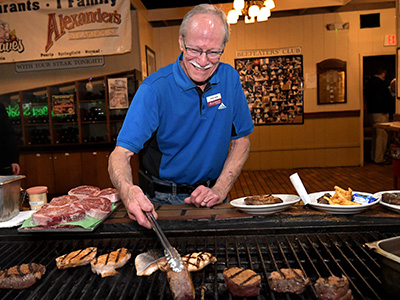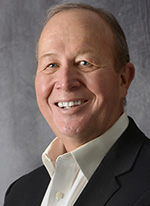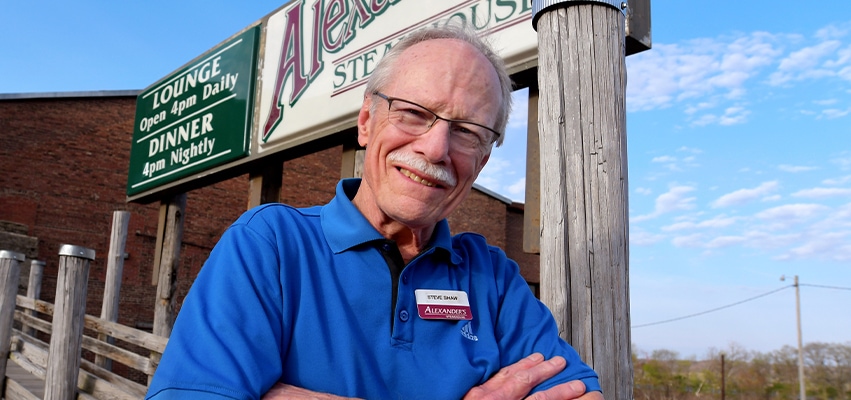Steve Shaw, one of the deans of the central Illinois restaurant scene with nearly five decades behind him in local kitchens and dining rooms, is easing into “retirement.”
Of course, you have to know Steve Shaw, because he may not share your definition of “retirement.” At 74, what “retirement” means to this Peoria native is that he’ll be cutting back to about 40 hours a week, or “half time.”
At a recent reception celebrating his life’s work, speaker after speaker got up at the company’s flagship restaurant, Alexander’s Steakhouse in Peoria, to laud Shaw’s tireless work ethic – someone did the math and came up with nearly 175,000 hours he’d logged over the years — with customers and well-wishers covering two levels of a wing of the enormous building, which can seat 750.
“It’s just in my DNA, probably from my dad,” Shaw said of his father, Hugh, who ran an insurance business in town. He was of a generation where it was “’Hey, get up on the roof. Fix the gutters. Cut the grass. Paint the house’ … and the answer was yes. You didn’t say no,” Shaw recalled with a chuckle.
A 1972 graduate of Bradley University with a degree in business administration, Shaw initially was open to his father’s entreaties to join him in the insurance industry. But he was still searching for the right fit. He flirted with a desk job in Caterpillar’s part department, then tended bar at the Hitching Post on Farmington Road. Finally, he landed at the legendary Sea Merchant in East Peoria (now Jonah’s).
“That got me hooked,” he said. And despite the ups and downs of the restaurant business and its demands, he’s not regretted it, not for a second.

As president of Mercedes Restaurants, Inc., Shaw has overseen some of central Illinois’ most iconic eateries, from Vonachen’s Old Place at Junction City to the Grille on Fulton in Downtown Peoria to Alexander’s Steakhouse on Peoria’s industrial waterfront, still going strong today. Next year marks its 40th in business. Along the way, he and his partners became Famous Dave’s franchisees; today Mercedes is among that popular BBQ joint’s longest-lasting affiliations.
Mercedes was born in the early 1980s when several guys with roots in the old Boar’s Head restaurant got together, including Laurel Rainwater, who eventually matriculated to the West Coast, where he made a name for himself primarily in the San Diego area. Ultimately, the company would open some 17 restaurants, running up to 10 at any given time, mostly in Illinois, though there were ventures into Indiana, Missouri, Oklahoma and California.
Not bad for a Shaw who grew up on Parkside Drive near Bradley Park, Peoria High Class of 1966, whose family didn’t go out to eat unless it was to Jumer’s for a special occasion or to Hunt’s Drive-In for a “Mr. Big” burger.
“VOP’s was a fun place,” recalled Shaw. The restaurant introduced the area’s first wood-fired pizza oven. The train dining car drew families and nostalgists, and its incomparable happy hours, including its famous Button and Wormeater’s clubs, packed people in elbow to elbow.
There were others of varying success – anyone remember the Hawaiian-themed Tiger Pit in Pioneer Park, or Sonoma Cucina in Bloomington? — lasting from nine months to 40 years. You could say that Shaw and his team have learned a few things along the trial-and-error way.
“Location, location, location” certainly matters, but some restaurants – like Mercedes’ most enduring, Alexander’s – prove that other factors matter more. Indeed, at first blush, the Averyville neighborhood restaurant – not fully visible from the Adams Street main drag, in an old, worn industrial area in a building of 16,000 square feet that previously housed a paper manufacturer, a distillery, a castings manufacturer, the old Wharf restaurant — seemingly would not have been the ideal site.
The lesson is that if the food is good and the service friendly and efficient, customers will find you, even in the most out-of-the-way place.
“Once they figure out where you’re at,” the next thing is “the quality of the product. The consistency is so important,” said Shaw. “We don’t sell tires. We’ve got to sell good steaks. Protein is not cheap right now, but … we don’t compromise on quality.”
Beyond that, “as an independent, if you don’t do things to connect with your customer, you’re not going to survive. We don’t have new buildings. We don’t have national name recognition. What we have is good people. That makes the difference.” Indeed, walk into many a chain restaurant and “chances are you don’t know the manager,” he said. “Chances are he’s not going to come by the table and say hi.”
Shaw and his managers are a constant and visible presence, working the room, asking diners about their experience, chatting up their kids – “young children make a dining decision more than you think. It’s the 11-year-old that will want to go to Alexanders because of some experience he’s had, and he might bring 15 people.” No one has to guess who’s in charge.
Local, hands-on management is critical. “With a distant restaurant, it’s a challenge. You’ve got to have managers with skin in the game,” said Shaw.
He repeatedly credited quality employees who have stuck with the company – “They’re the key” — a few up to 30 years, others who had long runs, left, then returned. That doesn’t happen so often anymore.
“Hiring after COVID has been the biggest challenge,” admitted Shaw. Looking back over the last half century, the pandemic probably posed the biggest threat to survival. The Payroll Protection Program (PPP) “was a salvation for many restaurants,” including his own.
Customers have had to get back in the habit of going out again. Their tastes have evolved, too.
“COVID exaggerated that experience,” but it would have happened anyway, said Shaw. “People are so busy today … Two family incomes, kids are involved with three different sports …”
Anyone who makes it in the modern restaurant industry must learn to roll with the changes. Technology has altered everything. Customers scan QR codes on their iPhones and the menu pops up on a screen. “Dashboard dining” and “fast casual” are today’s buzzwords. Restaurants aren’t smoke-filled anymore. Two-martini lunches are a thing of the past. If big groups seeking a communal experience – bachelor parties, team get-togethers, etc. – used to be attracted by Alexander’s grill-your-own feature, now 95 percent of customers let somebody else do the cooking. Restaurants have squeezed their hours.
What hasn’t changed is the commitment of time to be successful. That and the personal touch that goes such a long way. Indeed, there’s no telling how many prospective students/athletes Alexander’s helped the U of I, ISU and Bradley impress, the latter with the big
“B” branded into their steak or Texas toast. The restaurant recently hosted a hockey team from Virginia, 25 players and coaches, all of whom pre-ordered 14-ounce top sirloins. Families still come for holidays, birthdays, anniversaries, graduations, any milestone.
In any case, this marks a transition for Mercedes. Long-time partner Ron Helms will become president, and Shaw will become chairman of the board and stay on as a “working consultant.” In short, he wouldn’t know what to do with himself if he just walked away, given that so much of his life has revolved around his restaurants. Wife Patti was an employee before she said “I do” and they had three sons together. They’ll celebrate 42 years and multiple grandchildren in September.
“It’s a passion,” said Shaw. “You have to love what you do. If you enjoy your job, you’ll never work a day in your life. I really believe that.”





